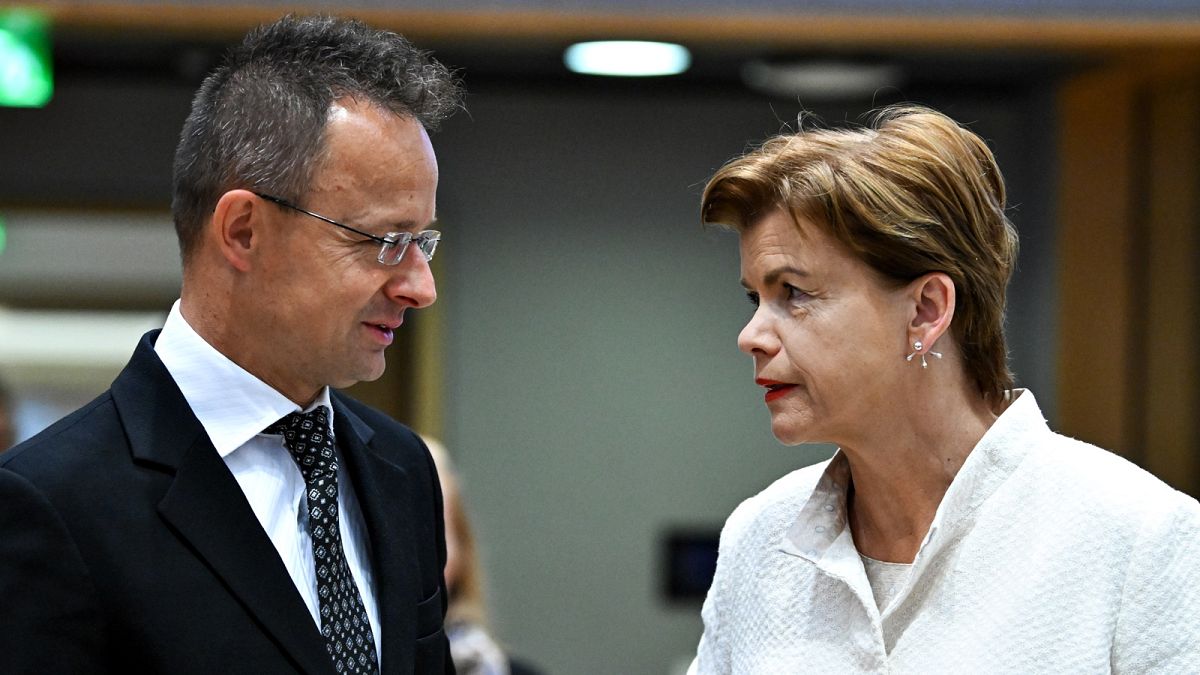Hungary continues to veto EU military assistance to Ukraine, preventing member states from getting their donations partially reimbursed.
Foreign affairs ministers of the European Union did not mince words on Monday when expressing their exasperation about Hungary’s long-running veto on military assistance for Ukraine.
“It has gone very, very far,” said Lithuania’s Gabrielius Landsbergis.
The blockage began a year ago when Budapest refused to endorse a €500-million tranche under the European Peace Facility (EPF), an off-budget tool that allows member states to obtain partial reimbursements for the military equipment they send to Kyiv.
The dispute, which has caused a great deal of frustration among EU diplomats, was exacerbated after member states reached in March a hard-fought deal to top up the EPF with an additional €5 billion, designed to be rolled out until the end of the year.
Hungary’s veto on the €500-million envelope means the next €5 billion cannot move forward, creating an across-the-board obstruction of EU aid. As a result, countries have shifted to bilateral donations that bypass Brussels.
The delays have become an embarrassment for the bloc, as Ukraine battles a new hard-hitting offensive by Russian troops in the northeast region and President Volodymyr Zelenskyy pleads with the West to step up supplies of weapons and ammunition.
On Saturday, Russian air strikes against a supermarket in Kharkiv killed at least 16 people and left 65 injured, according to local authorities.
Frustration grows
“We cannot accept that a single country, which also signed in favour of this amount a few months ago during a summit between heads of state, is now blocking this crucial aid for Ukraine,” said Belgium’s Hadja Lahbib.
“We must absolutely assume our responsibilities and do what is necessary to help Ukraine militarily,” she added.
Her Estonian counterpart, Margus Tsahkna, said that “every time” ministers come to Brussels, they are faced with Hungary’s vetoes on “very important initiatives.”
“We have to take down the (blockage) in the meaning that we have to convince Hungary. But it’s crucial that Ukraine needs this kind of support,” Tsahkna told reporters.
Latvia’s Baiba Braže said the EU’s political unity should translate into “actual, practical deliverables” and lamented a “number of issues” being held up in the Council.
“We expect those member states to relent,” she said.
Lithuania’s Landsbergis delivered the most scathing assessment, decrying the Hungarian attitude as a “systematic approach towards any efforts by the EU to have any meaningful role in foreign affairs.” The minister referred to Ukraine’s accession process and Georgia’s “foreign influence” law as instances in which Budapest attempted to derail collective decisions.
Prime Minister Viktor Orbán has defied the Western consensus by conducting overt Russian-friendly policy and demanding concessions to water down sanctions.
“It’s not case by case. And we have to start talking about this,” Landsbergis said. “I know that in some cases it might look as a non-diplomatic thing to do because, you know, we’re kind people and polite people.”
Hungary to derail use of immobilised Russian assets?
The reasons for the veto have baffled officials in Brussels. Budapest initially refused to approve the €500-million tranche because Ukraine’s anti-corruption agency had blacklisted Hungary’s OTP Bank as an “international sponsor of war.”
The designation infuriated Orbán’s government and triggered a spat between Budapest and Kyiv, with Brussels awkwardly caught in the middle.
OPT Bank was eventually removed from the name-shaming catalogue but Hungary kept its veto firmly in place, arguing it needed further guarantees that no other Hungarian company would be blacklisted in the future.
Diplomats have rolled their eyes at this reasoning, which they see as capricious and unfounded. They now fear the obstruction of the EPF could derail the new agreement to use the extraordinary revenues stemming from Russia’s immobilised assets.
The project could raise between €2.5 billion and €3 billion annually, 90% of which would go into supplies of weapons and ammunition for Ukraine.
While Budapest did not block the legal deal on immobilised assets, it could still use its veto power to thwart the release of fresh money.

